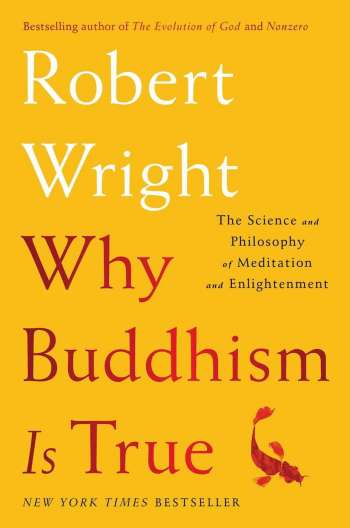Book Review: Why Buddhism is True: The Science and Philosophy of Meditation and Enlightenment
By Tsering Namgyal
Buddhistdoor Global
| 2018-02-12 | Mindfulness meditation has earned a big following in the West in recent years, thanks in large part to its therapeutic benefits. It is no surprise, therefore, that Robert Wright, a best-selling science journalist, would be drawn to this fascinating and occasionally contentious subject.
At the beginning of his ambitious book, Why Buddhism is True: The Science and Philosophy of Meditation and Enlightenment, Wright explains his motives for this writing project: “For more than two millennia, Buddhism has been studying how the human mind is programmed to react to its environment, how exactly the ‘conditioning works,’” he relates. “Now, with Darwin’s theory, we understood what had done the programming.”
 From simonandschuster.com
From simonandschuster.comWright realizes that Buddhism has actually prescribed an elegant solution for a path out of that conditioning, something that the Western psychology he has been writing about for so many years (The Moral Animal [1994], The Evolution of God [2009]) has so far failed to do.
To demonstrate for himself whether the Buddhist way works in reality, Wright enrolled in a meditation retreat (vipassana or insight meditation, commonly seen as originating from the Theravada Buddhist tradition.) Wright recounts how undertaking the meditation retreat made him feel happier, and how his wife even noticed a change in the tenor of his voice, and he professes that he has begun to see the world in a more positive light. He also meets with some well-known experts—mostly Western practitioners of Buddhism—to discuss the meaning of Buddhist concepts such as “no-self” and “emptiness.” In the end, Wright concludes that these ideas can be more or less scientifically proven, all of which persuades him to make the grand proclamation that Buddhism is “true.”
Comparing and analyzing Buddhism through the lens of science has become a recent trend among Buddhists, and there is significant dialogue taking place between Buddhist scholars and scientists. Numerous papers have been published on the subject, with some appearing in leading academic journals. All of this interaction is generally a good thing, but also begs the question just why do the Buddha’s teachings require any validation from, let alone need to be judged by, Western science? And perhaps more importantly, one wonders why should Western science be considered the gold standard for assessing the philosophical and moral truth contained in the Dharma? As the author himself observes, Buddhism and Western science are two very different fields and have “different modes of inquiry, different standards of evidence.”
To suit his study, Wright performs a neat research trick: he points out that the kind of Buddhism to which he is referring is “naturalistic” Buddhism—in other words, “Western Buddhism”—which excludes “supernatural” and “exotic” aspects such as rebirth. Of course, Wright does not consider himself a Buddhist. Nor does he concern himself with more subtle subjects such as consciousness, let alone to what happens to consciousness after death (he has clearly not visited Hong Kong’s haunted houses!) He forgets to mention that there are many Buddhist practitioners in the West who do believe in such things as rebirth, especially followers of Vajrayana Buddhism.
 Robert Wright. From denverpost.com
Robert Wright. From denverpost.comIn the end, this book is less about Buddhism and more about the efficacy of mindfulness meditation. That meditation works, of course, is not really news. Its success has spawned an entire industry of mindfulness-based stress reduction programs, books, and associated paraphernalia. So, too, has yoga, yet it would be misleading to write a book on the benefits of yoga titled Why Hinduism is True: The Science and Philosophy of Yoga and Enlightenment, because there is a lot more to Hinduism than yoga. More importantly, any interdisciplinary book on the meditative practices—and the different shades of emotions and feelings that come with the terrain—is ultimately doomed to fall short because much is often lost in translation.
Wright spends a considerable amount of time in his book discussing feelings. He notes how we humans use our senses to translate our experience of the world: naming things, giving them “essence” that they do not have of their own. The mind that relies on language (there are many types of mind in Buddhism) has its limitations because, as French writer Albert Camus famously observed, “For description to be realistic, it has to be limitless.” But Wright does not have much to say on language (think of advertising and branding) and how it traps and ensnares our minds. This was a wasted opportunity because it would have given the reader a much richer and more intellectually meaty treatise on Buddhism and its relevance to the modern world.
Meditation is more an art than science and any attempt to explain it purely in terms of science is a fool’s errand at best. Wright misses the point and, as many Buddhists also do, falls prey to what might be described as a science trap among modern Buddhists who are keen to seek empirical corroboration from scientists. They could instead use that time to engage in more in-depth study and analysis of the Buddhist canon.
Tsering Namgyal is a Hong Kong-based journalist and the author of the novel The Tibetan Suitcase, which will be published later this year.
References
Wright, Robert. 2017. Why Buddhism is True: The Science and Philosophy of Meditation and Enlightenment. New York: Simon & Schuster.
Related features from Buddhistdoor Global
Creating a Compassionate Civilization: An Interview with Robertson Work
The Mind in Language: Jane Hirshfield’s The Beauty
Book Review—Our Pristine Mind: A Practical Guide to Unconditional Happiness
One Face of Liberation: Buddhist Feminism in Japan

















